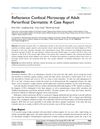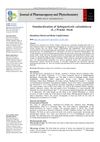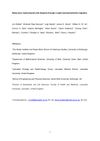
The Chromolaena odorata patch significantly speeds up wound healing.
 January 2024 in “International journal of pharmaceutical sciences review and research”
January 2024 in “International journal of pharmaceutical sciences review and research” Indian jujube has many medicinal properties and can help treat ailments like diabetes, inflammation, and cancer.

Henna has many medicinal uses but needs more research to confirm its benefits.

Elastin-like recombinamers show promise for better wound healing and skin regeneration.
 November 2023 in “Linköping University medical dissertations”
November 2023 in “Linköping University medical dissertations” Keratinocytes and adipose-derived stem cells can effectively heal difficult skin wounds.
 November 2023 in “bioRxiv (Cold Spring Harbor Laboratory)”
November 2023 in “bioRxiv (Cold Spring Harbor Laboratory)” Disrupted cholesterol production impairs hair follicle stem cells, leading to hair loss.
 October 2023 in “Biomedical science and engineering”
October 2023 in “Biomedical science and engineering” Innovative methods are reducing animal testing and improving biomedical research.
 October 2023 in “European medical journal. Dermatology”
October 2023 in “European medical journal. Dermatology” Hair loss greatly affects quality of life, and dermatologists are crucial for proper diagnosis and treatment.
 October 2023 in “International journal of biology, pharmacy and allied sciences”
October 2023 in “International journal of biology, pharmacy and allied sciences” Personalized treatment plans combining natural and synthetic approaches are important for managing alopecia effectively.
 September 2023 in “Stem cell reviews and reports”
September 2023 in “Stem cell reviews and reports” Scientists found a new, less invasive way to get stem cells from horse hair for veterinary medicine.
 August 2023 in “International journal of research in medical sciences”
August 2023 in “International journal of research in medical sciences” The serum is safe and helps treat premature greying of hair.
 August 2023 in “International journal of basic and clinical pharmacology”
August 2023 in “International journal of basic and clinical pharmacology” Herbal hair serum promotes natural hair growth and maintains healthy hair.
 July 2023 in “International journal of pharmacognosy and life science”
July 2023 in “International journal of pharmacognosy and life science” The herbal hair oil made from various plants might be a good alternative to synthetic hair loss treatments.
 July 2023 in “The Egyptian Journal of Hospital Medicine ”
July 2023 in “The Egyptian Journal of Hospital Medicine ” Alopecia areata is a hair loss condition caused by immune factors and can be treated with JAK inhibitors.
 July 2023 in “Clinical, cosmetic and investigational dermatology”
July 2023 in “Clinical, cosmetic and investigational dermatology” Reflectance confocal microscopy helped tell periorificial dermatitis apart from similar skin conditions.
 June 2023 in “Historical records of Australian science/Historical Records of Australian Science”
June 2023 in “Historical records of Australian science/Historical Records of Australian Science” George Ernest Rogers was a notable scientist who made important discoveries about hair and wool proteins.
 May 2023 in “Journal of pharmacognosy and phytochemistry”
May 2023 in “Journal of pharmacognosy and phytochemistry” The study established quality standards for Sphagneticola calendulacea stem and suggested it may have therapeutic benefits.

A new system for classifying curly hair types using precise measurements can improve hair care products and cultural inclusion.
 March 2023 in “Scientific reports”
March 2023 in “Scientific reports” Hair growth-related cells need the enzyme SCD1 to help maintain the area that supports hair growth.
 January 2023 in “Czech Journal of Animal Science”
January 2023 in “Czech Journal of Animal Science” Proteins influence the quality and traits of cashmere goat fleece, affecting hair strength and diameter.
 January 2023 in “bioRxiv (Cold Spring Harbor Laboratory)”
January 2023 in “bioRxiv (Cold Spring Harbor Laboratory)” Newly born mesenchymal cells quickly spread out in response to tissue tension during early development.
 January 2023 in “European endocrinology”
January 2023 in “European endocrinology” People with alopecia have a higher risk of thyroid cancer.
 December 2022 in “Deleted Journal”
December 2022 in “Deleted Journal” Sheep wool keratin solution safely and effectively promotes hair growth.

New methods to classify curly hair types were developed based on shape and strength.

Water and fatty acids affect hair's surface differently based on hair damage, and models can help understand hair-cosmetic interactions.
 September 2022 in “International journal of pharmaceutical quality assurance”
September 2022 in “International journal of pharmaceutical quality assurance” The herbal shampoo is less damaging and improves hair's appearance.
 August 2022 in “bioRxiv (Cold Spring Harbor Laboratory)”
August 2022 in “bioRxiv (Cold Spring Harbor Laboratory)” Mouse touch-sensitive nerve cells adjust their connections based on competition with other similar cells.
 April 2022 in “Journal of applied science and environmental management”
April 2022 in “Journal of applied science and environmental management” Alligator pepper seed extract improved wound healing in rats.

Human hair keratins can be turned into useful 3D biomedical scaffolds through a freeze-thaw process.
 September 2021 in “Physiology News”
September 2021 in “Physiology News” Addressing underrepresentation in Parkinson's research is crucial for better treatments and understanding.






























